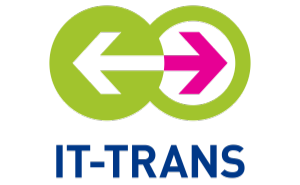25. March 2024
We must shift our focus away from large highway projects
Interview with Victoria Markewitz, Via Transportation
Victoria Markewitz is one of six headline speakers at the IT-TRANS conference from May 14-16. She is Partnerships Director at Via Transportation and will be speaking on a top-tier panel about Mobility-as-a-Service (MaaS) and on-demand mobility – both major topics for Via. The company advises and supports municipal clients, as well as transport associations, on the implementation of digitally networked transport systems. The IT-TRANS team spoke to her about the difference between urban and rural mobility, and examples of successful urban transport planning.
Ms. Markewitz, where do you see future mobility in the next ten to 15 years? What will be the key changes?
- Looking ahead to the next 10 to 15 years, the future of mobility appears to be increasingly interconnected and dynamic. We anticipate a shift towards more sustainable, efficient, and inclusive transportation solutions. Key changes will likely include the widespread adoption of electric vehicles, advancements in autonomous technology, and the integration of various modes of transportation into seamless, flexible and user-friendly networks. If we care about issues like reducing poverty, stimulating the economy, and combating the climate crisis, we must shift our focus away from large highway capital projects, and invest more in innovative, equitable public transit at the federal, state, and local level. Cities in Germany like Hannover have created a blueprint for how communities can reimagine transportation for their residents – reducing congestion, improving access to opportunities, and removing the financial burden of needing to own a private car. We look forward to working with other communities across the region in months to come.
Mobility as a Service (MaaS) is often already a reality in urban areas: what possibilities do you see for rural areas? How can connections between rural and urban areas be improved?
- While MaaS has made significant strides in urban areas, its potential in rural areas is equally promising. Via envisions leveraging our technology to optimize on-demand transit solutions for rural communities, enhancing connectivity and accessibility. This could involve flexible routing and scheduling to accommodate the unique needs of rural populations, while also using more ubiquitous MaaS apps to feed important data back into transport planning schemes. Via Transportation also supports and advises local authorities and transport companies on transport planning. What needs do your customers have here? And have the requirements for transport planning changed today — keyword sustainability, keyword quality of life in city centers? In supporting and advising local authorities and transport companies, we've observed a growing demand for transport planning that aligns with sustainability goals and enhances the quality of life in city centers. Customers now seek solutions that prioritize environmental impact, affordability, and community well-being. Via aims to address these needs by offering tailored, data-driven insights and innovative transit solutions.
Via Transportation also supports and advises local authorities and transport companies on transport planning. What needs do your customers have here? And have the requirements for transport planning changed today — keyword sustainability, keyword quality of life in city centers?
- In supporting and advising local authorities and transport companies, we've observed a growing demand for transport planning that aligns with sustainability goals and enhances the quality of life in city centers. Customers now seek solutions that prioritize environmental impact, affordability, and community well-being. Via aims to address these needs by offering tailored, data-driven insights and innovative transit solutions.
Do you have an example of a particularly successful example of modern transportation planning?
- As for an example of successful modern transportation planning, our collaboration with [insert city/region name] stands out. By implementing a comprehensive, data-informed transit network, we were able to optimize routes, improve service quality, and increase ridership. This not only enhanced the overall mobility experience but also contributed to the city's broader goals of sustainability and improved urban living.
You will be speaking at the IT-TRANS conference and Via Transportation will be presenting its solutions as an exhibitor: What are you personally looking forward to at IT-TRANS 2024?
- I am personally looking forward to the networking aspect and sharing best practices amongst industry experts. Whether this is via the official program panels, presentations, or the informal gatherings at the coffee stands or the evening reception. Coming together as an industry, learning from each other and connecting with existing business partners as well as making new connections is one of my main motivating factors attending IT-Trans.
Thank you!
Press
